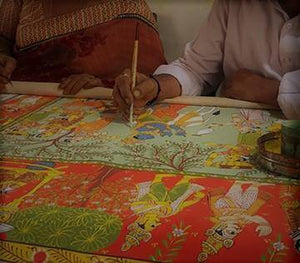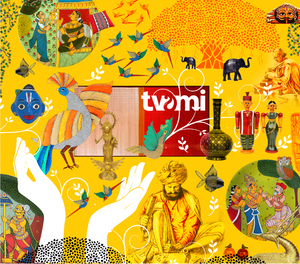
Pankaj Dungarbhai Makwana
Filters
Coming Soon
View all productsPankaj is a Patola artisan living in Surendarnagar in Gujarat and has been practicing the family craft ever since he was young. Patola saris have their origin in Patan and are a form of the ikat weave.
It is believed that nearly seven hundred silk weavers of the Salvi caste of Karnataka and Maharashtra moved to Gujarat in the 12th century to acquire the patronage of the Solanki Rajputs, the ruling class of Gujarat and parts of Rajasthan then.
Patola silks grew popular as a symbol of social status among Gujarati women. It even formed an essential part of the stridhan or the part of a bride’s assets that she receives from her family.
Pankaj is part of a joint family with six members. He practices Patola as part of a craft group. His most popular pieces are the double-ikat saris, which require tremendous patience, calculation, and effort.
While traditionally patola is always double ikat, to make it more affordable, they even make single ikat saris.
Pankaj says working with silk is a challenge in summer and during monsoons. This gives them only six months of proper weaving time. September to February is the peak of the craft season. He works for six to seven hours every day on the loom.
‘We have been trying to innovate our products because this generation doesn’t wear sarees. So now we make more of dupattas, stoles, and cushion covers.’, Pankaj talks about the evolution of Patola products.
They used to use chemical dyes but have shifted to eco-friendly dyes to help the environment and fulfill customers demands. Pankaj believes in being original and creates his own designs using traditional motifs. He enjoys experimenting and discovering accidental patterns.
‘I imagine something and then try to transfer it to fabric.’, he says about the process of creating. His entire family follows the craft. His children are also practicing Patola after completing their higher education. Pankaj believes that the craft is essential to his family roots and reinforces the message to his children constantly. He values his ancestors and says, ‘It’s a craft that runs in your blood and it’s important that we keep it alive.’
Pankaj even teaches Patola to students who are interested in learning. He loves the entire eighteen-step process, no matter how cumbersome it is.


